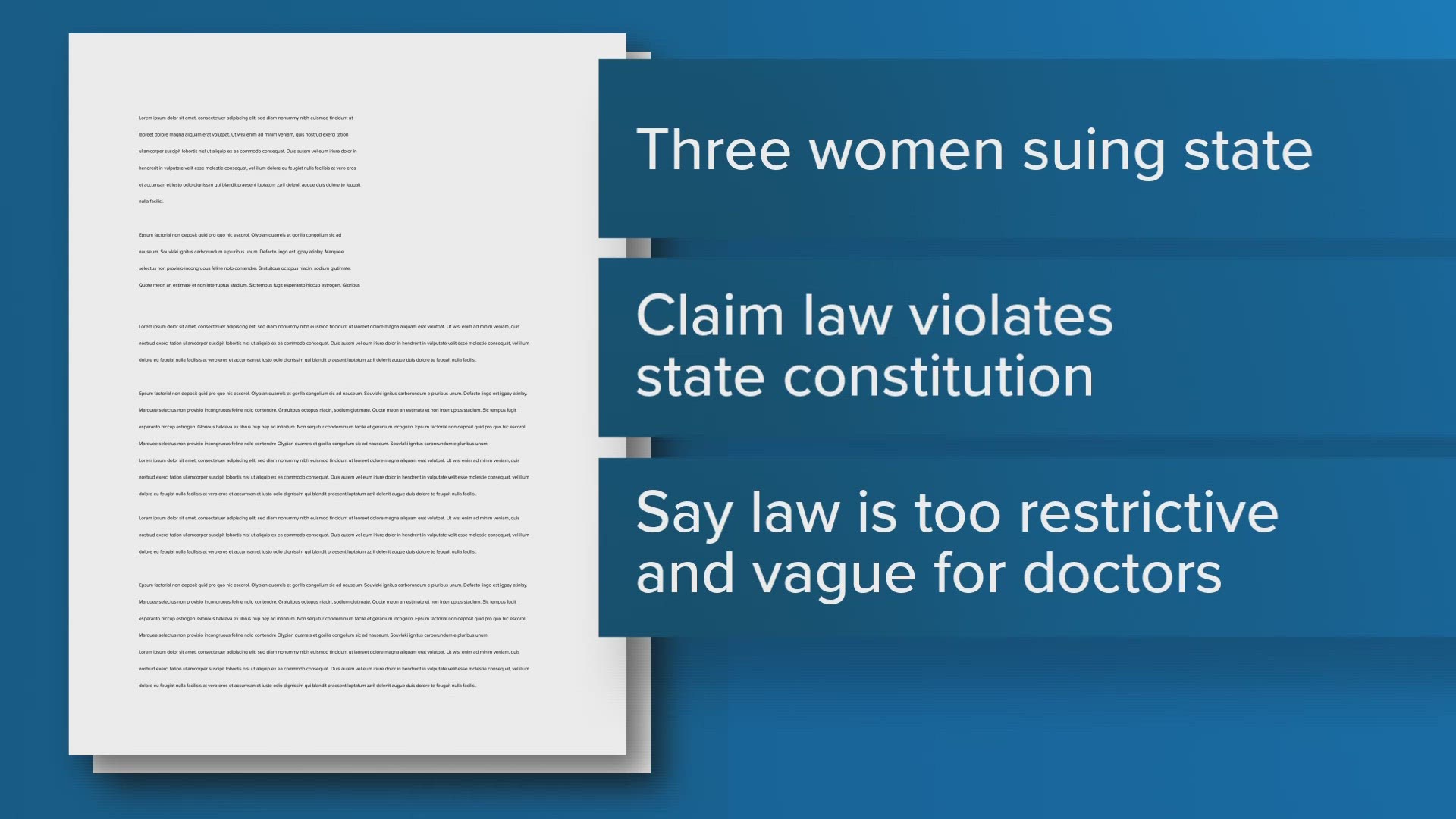NASHVILLE, Tenn. — Three patients and two doctors filed a lawsuit asking judges to declare that physicians in the state can perform abortion treatments if a pregnancy risks a patient's health.
They also asked for judges to declare that the "Tennessee Constitution guarantees a pregnant person the right to life," and to declare that pregnant people can legally get abortion care if they have an emergent medical condition that risks their health.
Soon after the U.S. Supreme Court overturned its Roe v. Wade ruling, the "Human Life Protection Act" went into effect in Tennessee. It made providing abortion treatments a felony in the state. Since it would be a felony, people who give abortion treatments could lose voting rights and face several other consequences, including fines or prison time.
The state requires doctors to provide an "affirmative defense" if they give abortion treatments. They would need to prove in court that the care met legal criteria. Narrow criteria were added to the state's anti-abortion law in 2023, allowing care for "ectopic or molar pregnancy."
The law specifically did not try to punish women who receive abortion treatments and instead punished providers if they did not prove in court that abortion care was necessary.
"Vague abortion bans like Tennessee’s inevitably hinder or delay the delivery of necessary medical care," the lawsuit says.
It was brought against Attorney General Jonathan Skrmetti and the Tennessee Board of Medical Examiners. Three Middle Tennessee patients and two Middle Tennessee doctors filed it.
"Abortion bans threaten the lives and harm the health of pregnant people," it says. "Since then, pregnant people in Tennessee have suffered needless physical and emotional pain and harm, including loss of their fertility. These pregnant people are not imagined. They are not ideological talking points. They are real people, many with children who depend upon them. Three of them are Plaintiffs in this action."
One plaintiff is a 31-year-old woman who said she was diagnosed with health issues similar to a brain tumor in May 2021 and learned she was pregnant in July 2022. Her pregnancy was considered high-risk, the lawsuit says, and she later learned her fetus was diagnosed with limb-body-wall complex, a severe diagnosis where organs develop outside the body.
However, she was not eligible for abortion care, and could only continue the pregnancy at risk of her health and the baby's health. At 31 weeks, she went into labor and the baby was stillborn.
Another plaintiff, an OB/GYN in Nashville, said before the ban she routinely gave abortion care. After the ban, she said she and her peers fear prosecutors and politicians would personally target them for providing care to people with emergent medical conditions. Another OB/GYN in Franklin said the same.
The lawsuit says another Johnson City woman also could not access medication used to treat her rheumatoid arthritis after Tennessee's ban went into effect, since the medication could also be used to terminate ectopic pregnancies.
"The confusion and fear seen in Tennessee is far from unique; politicians’ efforts to restrict critical abortion care have wrought the same results in other states," the lawsuit also says. "Every major mainstream medical organization, including the American Medical Association, the American College of Obstetricians and Gynecologists (“ACOG”), the American College of Emergency Physicians, and the Society for Maternal-Fetal, recognizes that abortion is necessary healthcare."
According to the Associated Press, women in three states including Tennessee challenged different states' strict abortion care laws. Lawsuits were also filed in Idaho and Oklahoma. A similar lawsuit was also filed in Texas earlier this year.
It says Tennessee adopted its own definition of "abortion," deviating from the standard medical definition of abortion care.
Along with the request for judges' declarations, the lawsuit also asks for "permanent injunctive relief" to stop the state from enforcing an abortion ban or instituting disciplinary actions related to the ban.
The Attorney General's Office said they would review the complaint when it arrives, and said Tuesday they were not yet served with it.

